5 Reasons Why Your Toilet Is Too Loud
Last Updated on September 21, 2022 by Alex Cubias
Is your toilet making loud noises, and are you not sure exactly what is causing the noises? Are you wanting to fix it but not sure where to start? This article can help you find some answers and solutions to quiet your loud toilet.
Five common reasons for loud toilet noises are a worn tank flap, a leak in the tank, high water pressure, calcium deposits, or a faulty fill valve. All of these reasons can easily be resolved. Oftentimes, the most difficult is diagnosing the cause of the noises.
To learn more about these reasons and how to fix them, keep reading!
1. Worn Tank Flap
If the sound you are hearing coming from the toilet is similar to the sound of rushing water coming from the sink, it is a good chance that your tank flap is worn and will need to be replaced. This sound, as well as its cause, is extremely common because of the frequent use of this part of the toilet. It is used every time the toilet is flushed and can wear out quickly if the toilet is used significantly often.
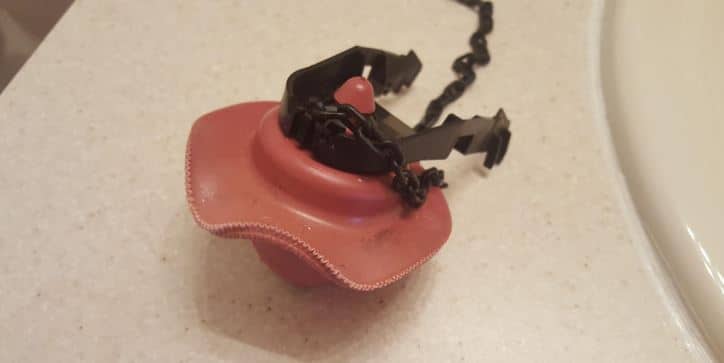
A worn tank flap can also cause your toilet to run water constantly and also possibly leak depending on how worn down it is. This issue is not difficult to fix nor expensive, so try it yourself before calling a plumber to come to fix it, and you may save yourself a lot of money.
All you need to do to repair the worn flap is to buy a new one and replace it. Before doing so, make sure the flap is actually damaged and needs to be replaced with a new one, there are instances where the flap is just loose making it appear to be damaged when it’s not. (Source)
If this is the issue with your toilet, try jiggling the toilet handle. It will help the flap engage. However, this is a temporary fix and the issue will get worse over time.
Related Article: HOW TO REPLACE A TOILET FLAPPER
2. Tank Leak
When there is a leak in the tank, your toilet can make a sound that is similar to when you flush the toilet. When the toilet makes this sound without anyone nearby who has recently flushed the toilet, it is called ghost/phantom flushing. You will need to take a look at your overall sewage system and identify if the leak is coming from there and then repair it as quickly as possible as it can also harm the environment.
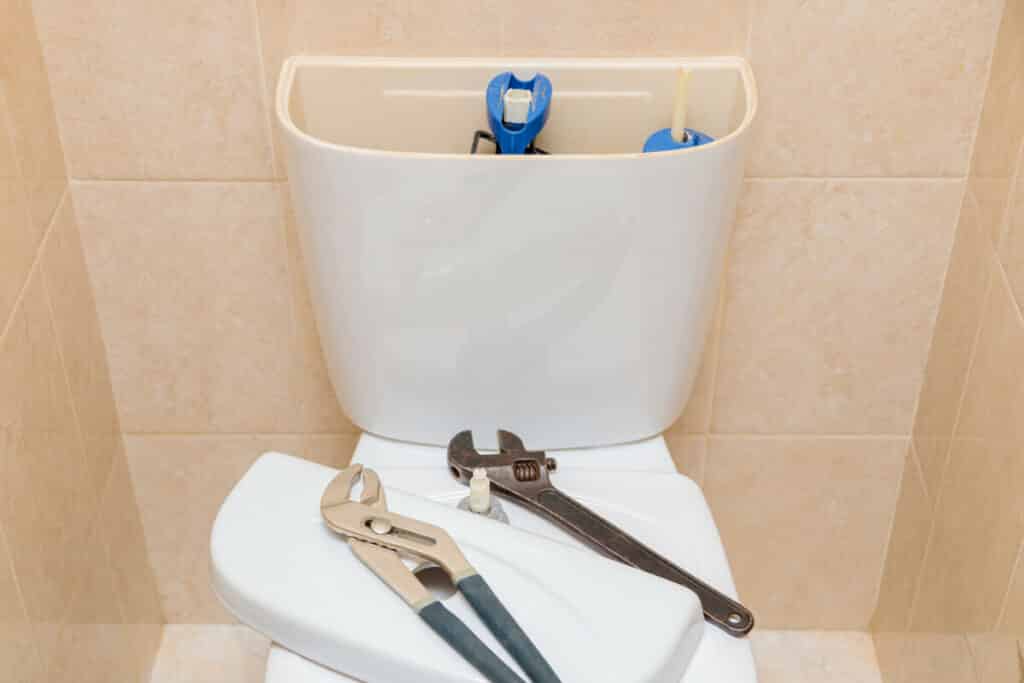
If the leak isn’t coming from the septic tank, check the water refill tube. If this tube isn’t positioned where it should be, it can cause the tank to leak. This tube should be placed directly above the overflow pipe, but make sure you don’t connect it to the overflow pipe.
If this doesn’t stop the leak the next steps would be to replace the tank flap, adjust the chain, reposition the refill tube, or replace the flush valve drain. If none of these next steps help, you may need to contact a professional for help.
Related Article: HOW TO FIX A LEAKING TOILET TANK
3. High Water Pressure
If your toilet is making banging sounds, it is likely that the water pressure in the toilet and its connecting pipes is either high or somewhat restricted when it is making its way to the tank from the pipes. This sound only happens when the toilet is being flushed, so you won’t know if there is a problem if the toilet is not being used because having high water pressure in the toilet and pipes won’t present any noise until there is water moving through them, like when you flush the toilet.
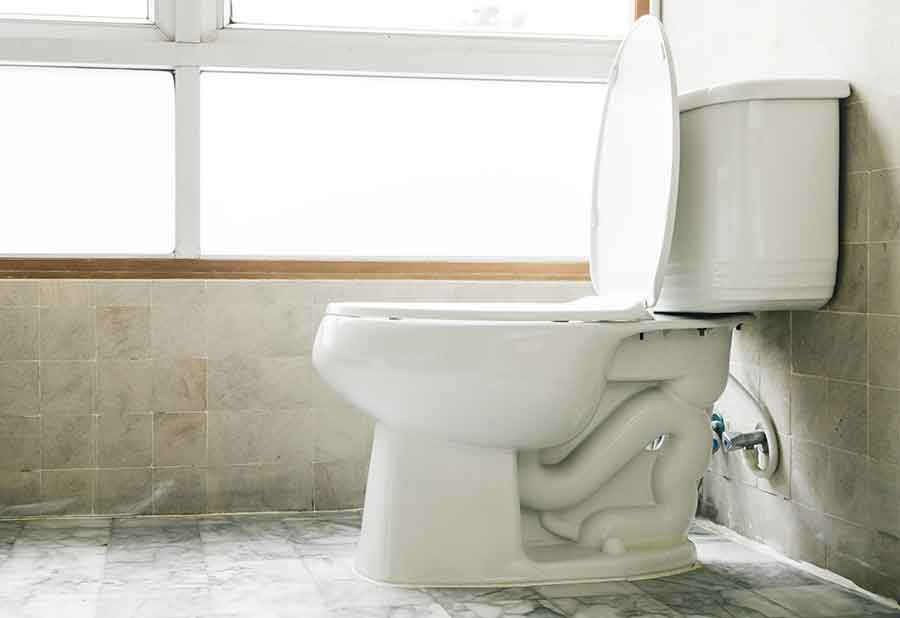
The simple fix to this is to lower the water pressure in the pipes that deliver the water to the tank. To do this, you will need to find the pressure-reducing valve, which is most often found next to the main water supply line. To sufficiently lower the water pressure to fix the issue, you will need to lower the psi to 50 or below. If this doesn’t fix the sounds, try replacing the float valve or installing an air chamber in the tank.
4. Calcium Deposits
Depending on how much calcium deposits are affecting the performance of the pipes in the toilet, there may or may not be noise being produced by it. The majority of the time calcium deposits are only found on the interior of the pipes, but if they get on the outside of the pipes, that is a sure tell-tale sign that they are on the inside. Because those calcium deposits can build up and clog the pipes, it can cause noises that are not typical with a clean, unobstructed pipe.
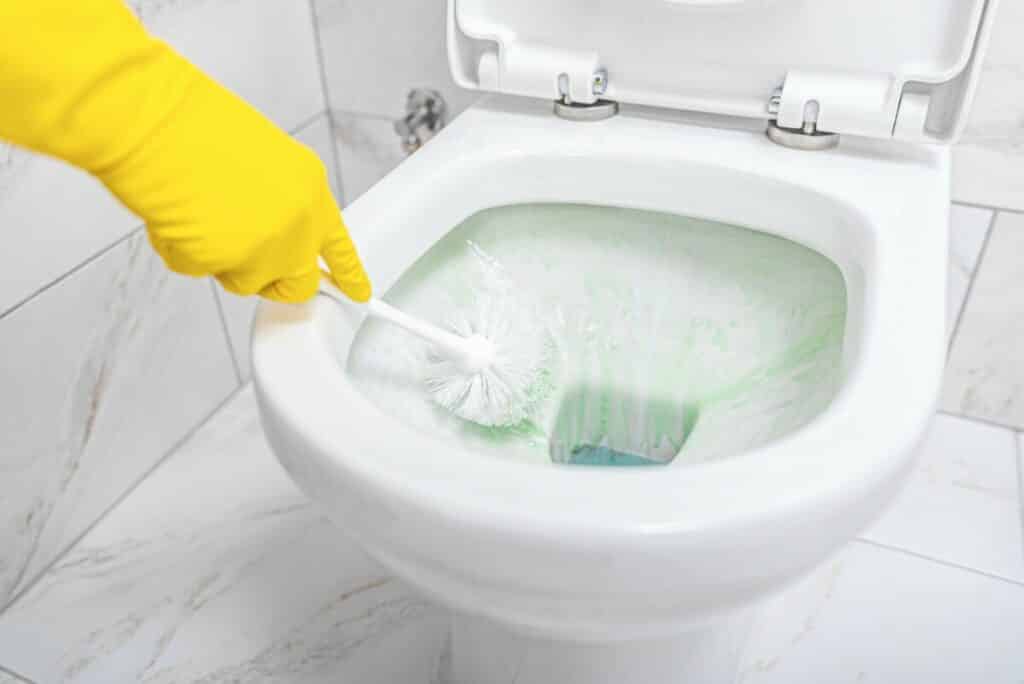
If you are suspicious of calcium deposits growing on the inside of the pipes but don’t see any remnants on the outside, you will need to unscrew the pipe and look inside to check. If you haven’t had this issue yet, it is a good practice to clean the pipes out regularly in an effort to prevent anything like that from happening when the build-up gets to be too much. If you feel uncomfortable messing with the pipes, you can call a plumber to do it for you. (Source)
5. Faulty Fill Valve
Because your toilet has to be consistently replenishing the tank with water every time it flushes, if there is a leaky valve there will not be a cue for the water to stop filling into the toilet which creates the sound. In order to assess if this is the cause of the issue or not, you will need to check behind the toilet and identify if there is anything wrong with the fill valve. Some points of concern should be if there is any leaking, corrosion, rust, or calcium deposits.
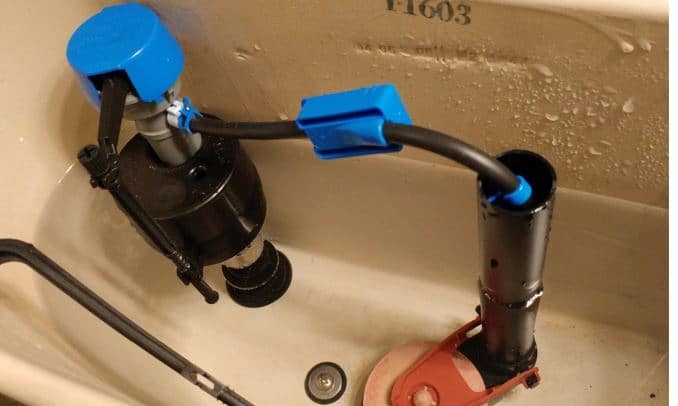
If there is any rust or corrosion on the valve, you will need to replace the valve entirely. If there is leaking, it is likely you may just need to tighten the nuts and that should fix the leaking as well as the sound. If not, you may need to check the connection of that pipe on the septic tank’s end.
Related Article: 5 BEST TOILET FILL VALVES